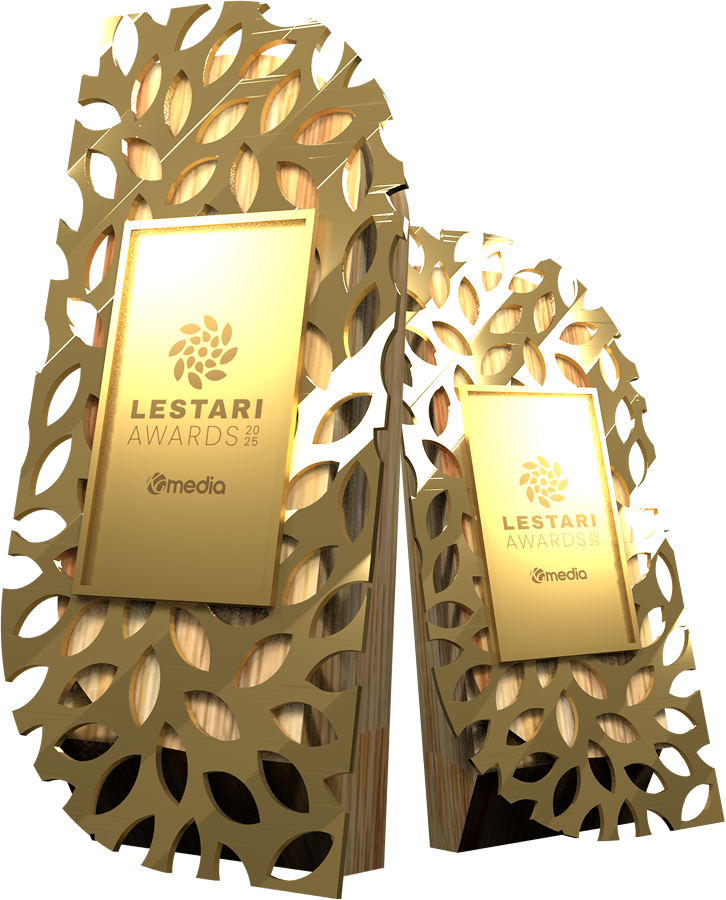



Lestari Awards 2026
Registration is officially OPEN!
Introducing new categories for 2026


Recognizing an organization who has implemented a program that has conserved, restored, regenerated or rehabilitated and developed sustainable ecosystems including existing terrestrial or aquatic ecosystems. Program examples: - Wetland conservation programs - Coral reef restoration and marine biodiversity protection - Responsible sourcing practice, applying environmental and social safeguards for raw materials and commodities - Reforestation projects through tree planting - Biodiversity park to protect flora and fauna species and/or to provide research and development facilities Additional note for Regional Awards: - This is a regional category, if you win, you will need to resubmit your entry in English
Recognizing an organization which has implemented innovative methods that successfully improve reduction, reuse, and recycling of solid waste, as well as responsible waste disposal. Program examples: - Paper usage reduction - Upcycle within operations to minimize landfill waste - Composting program and workshop for organic waste - Waste bank system to encourage recycling Additional note for Regional Awards: - This is a regional category, if you win, you will need to resubmit your entry in English
Recognizing organizations committed to circularity by reducing resource use and waste through regenerative practices. This includes designing products and processes for reuse, repair, recycling, and regeneration, ensuring continuous material flows and longer product life cycles to cut environmental impact and create lasting value. Program Examples: - Closed-loop production systems - Upcycled product line - Use of recycled or upcycled materials in manufacturing - Take-back programs for products and packaging - Integration with advanced waste management practices (repair, refurbishment, and remanufacturing initiatives) - Product life cycle assessments (LCAs) implementation
Recognizing an organization which favors renewable energy sources in its supply and organization value exhibited chain. The originality, provided market-based solutions and environmental benefits, whilst created significant socio-economic contribution through the use of renewable energy in its products and/or programs. Program example: - Solar-powered irrigation systems - Utilization of biomass energy - Provide renewable energy solutions, such as solar home system - Solar-powered for energy-intensive industries operations Additional note for Regional Awards: - This is a regional category, if you win, you will need to resubmit your entry in English
Recognizing an organization which has demonstrated energy efficiency and energy conservation throughout its supply and value chain, developed best energy-saving projects, whilst demonstrated energy savings, backed-up by data, with particular consideration for innovation and replicability. Program examples: - Automated energy management (or switch-off) systems for lighting, cooling and other electrical use - Utilization of lighting systems with energy-efficient LEDs - Energy-efficient equipment Additional note for Regional Awards: - This is a regional category, if you win, you will need to resubmit your entry in English
Recognizing an organization that has proactively initiated and led efforts to eliminate discrimination and enhance inclusivity across the workplace and value chain. This organization has demonstrated excellence in fostering an equitable work environment, improving employee engagement, and ensuring social, economic, and political inclusion for all—regardless of gender, disability, race, origin, or other socioeconomic status. Program examples: - Inclusive employment programs for persons with disabilities and/or marginalized communities - Leadership training programs - Partnership with women-led businesses or provision of opportunities to promote gender equality in entrepreneurship - Fair wages and equal pay for all gender Additional note: - This is a regional category, if you win, you will need to resubmit your entry in English.
Recognizing an organization which has advanced fundamental human rights and responsible labor practices throughout its operations, where the organization upholds fundamental human rights principles in all ways that they interact with people (employees, consumers, customers, suppliers, etc.). Program Examples - Human rights policy and due diligence - Anti-harassment and ethical workplace training programs - Fair wages and safe working conditions policy Supplier code of conduct requiring ethical labor practices - Ethical hiring - Supplier transparency - Employee check-ins program
Recognizing an organization which has developed and implemented innovative career development system, which may include effective, consistent and all rounded training programs to enable its talents to execute business strategies and contribute to long-term success of the organization. Program Examples - Continuous learning opportunities and/or professional certifications to employees - Leadership development programs for employees at all level - Mentorship schemes to support new hires Reference to UN SDGs - Comprehensive upskilling programs for technical staff
Recognizing an organization which has developed and implemented program to positively impact and strengthen links with the local community and indigenous people within the locality of which the organization operates. The program should respond to a specific need in the community and should focus on the measures taken to engage with the community and all relevant stakeholders, as well as the positive impact delivered through the program. Program Examples - Educational scholarship for children in underprivileged communities - Health and hygiene awareness campaign Reference to UN SDGs - Partnership with local suppliers, farmers and community - Healthcare or educational program tailored to community needs, such as mobile clinics or vocational training - Work-based learning program such as internship
Recognizing an organization which has developed and implemented effective programs to promote the health and wellbeing of employees which has contributed to the overall improvement in productivity and increase in satisfaction and morale of staff. Program examples: - Workplace fitness programs and subsidized gym memberships - Medical support to employees - Mental health counseling - Comprehensive healthcare plans for employees - Work-life balance program
Recognizing organizations that embed Environmental, Social, and Governance (ESG) principles in their supply chain through strategies and partnerships that promote sustainability and ethical practices. This category also focuses on programs such as responsible sourcing, supplier collaboration, and programs that reduce environmental and social risks across the supply chain. Program Examples - Supplier capacity building and development program - Collaboration with suppliers to on sustainability matters, e.g., emissions reduction and logistics efficiency improvement program - Green procurement policies for suppliers - Green logistics and digitalization - Supplier screening
Recognizing an organization that has established groundbreaking and mutually beneficial partnerships beyond its supply chain, leading to positive and sustainable impacts on communities and/or the environment. These partnerships may involve non-governmental organizations (NGOs)—which are independent, non-profit entities focused on humanitarian or development objectives—as well as local governments, communities, academia, or other stakeholders, with measurable outcomes that contribute to societal and environmental well-being. Program examples: - Collaboration with local governments to develop and promote renewable energy adoption in remote communities - Partnership with NGOs to implement large-scale reforestation projects - Collaboration with startups or tech companies to drive innovation and increase effectivity and efficiency in organizations cycle Additional note for Regional Awards: - This is a regional category, if you win, you will need to resubmit your entry in English1
Recognizing an organization that has significantly restructured its business strategies, operations, or models to integrate sustainable development principles, ensuring lasting economic, social, environmental and institutional benefits. Program examples: - Transition from a traditional manufacturing business to a circular economy model - Inclusive workforce transformation - Digital technologies adoption to streamline operations, improve sustainability tracking, improve efficiency and productivity Additional note for Regional Awards: - This is a regional category, if you win, you will need to resubmit your entry in English1
Recognizing an organization that has provided products and/or services which deliver meaningful environmental and social benefits while addressing local challenges and opportunities in Indonesia. These solutions incorporate sustainability principles into their design and execution, demonstrate innovation, market relevance, and a commitment to environmental stewardship, social progress, and economic resilience. Project examples: - Mobile applications development that promote sustainable living - Product design with minimal negative environmental impact - Secure certification for sustainable practices or product lines Additional note for Regional Awards: - There’s no regional competition for this category




- Complete the online registration form and submit all required information.
- Registration opens on February 13 and closes on May 9.
- Our team will review all applications to ensure they meet the eligibility criteria.
- Selected candidates will be shortlisted for Assessment Stage.
- A panel of expert judges will evaluate submissions based on established criteria.
- Selected candidates will be required to submit financial statements during the verification process.
- Finalists will present their projects online to the jury panel for further evaluation.
- Winners will be officially announced and celebrated at the Awarding Night.
- Winners are granted direct entry to the Asia ESG Positive Impact Awards 2026 regional competition.
Assessment regional competition the Asia ESG Positive Impact Awards 2026
Awarding night for the Asia ESG Positive Impact Awards 2026 at Kuala Lumpur, Malaysia

Register or log in with your KG Media ID to access the registration form.
Fill out the registration form and select the award category(ies).
Complete the final step by submitting your entry details and paying the required fee(s).

















